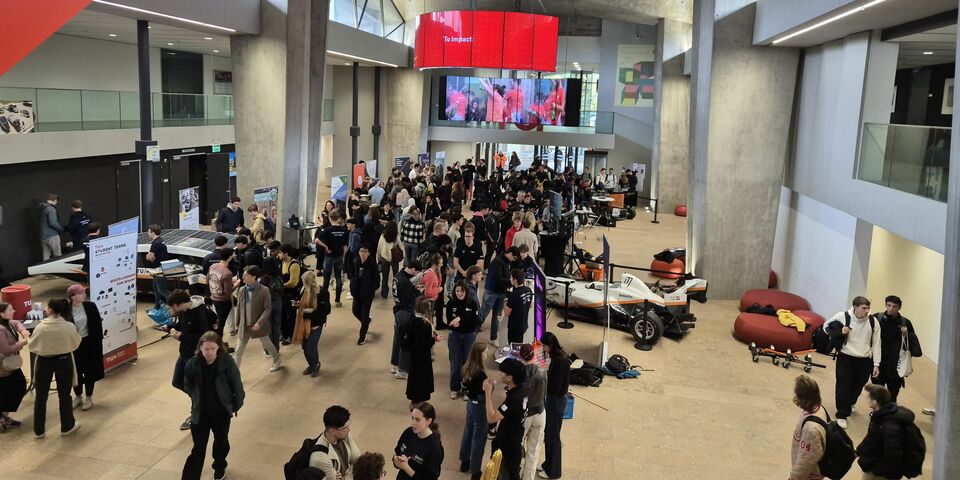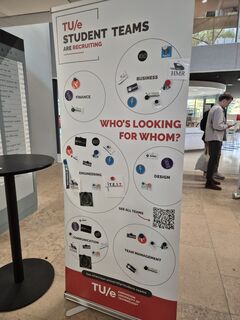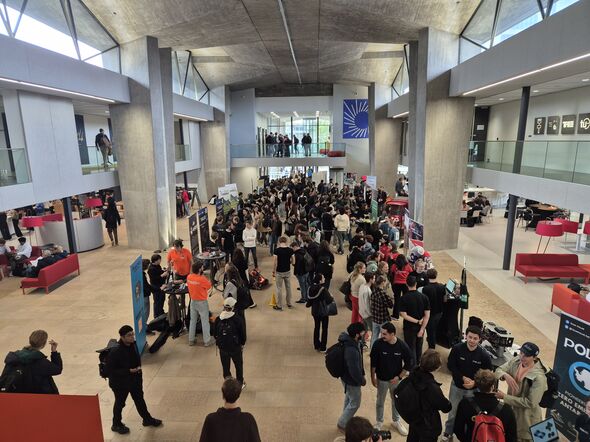Recruitment day for student teams leads to queues in Atlas
The ground floor of Atlas was packed with people yesterday afternoon. 27 student teams put in their best efforts to recruit new members – to varying degrees of success. Finding full-timers and students to fill non-technical positions proved challenging for many teams.
The coordinator of the student teams, Madis Talmar, calls it one of the busiest, if not the busiest recruitment day ever. Several things struck him. “It’s still too early to draw conclusions, but some teams seemed to be more successful in recruiting new members than others.” According to Talmar, potential new members are mainly interested in the teams’ culture, the learning opportunities and the amount of autonomy they will have.
He has also noticed that certain themes are more popular than others. “That changes over the years,” says Talmar. “For example, right now, robotics is very popular, where AI technology often plays an important role.” Sustainability on its own is actually declining in popularity, he believes. “Just having a story about sustainability isn’t enough anymore. You need to add another layer. If you can combine sustainability with a very specific topic, such as fast charging, then you’re speaking the language that appeals to new students.”
Reusable rockets
Team leader and founder Patrick Singer (Mechanical Engineering) is on the ground floor enthusing students about his team Void. The team is concerned with building rockets. Next year, they want to compete in EUROROC, a tournament in Portugal, where one of their goals is to build a reusable rocket that can land on its own. “That aligns with our mission to create re-ignitable rocket engines to enable universal access to space.”
According to him, the recruitment event is going very well. “We’ve already had ninety applications. Even though we’re a brand-new team, just one year in.” The team currently has 23 members, and with so many applications, there is no shortage of new recruits; but unfortunately, that only applies to part-timers. “Full-timers are harder to find. Adding them to our team is proving to be quite a challenge.”
The increasing difficulty in filling full-time positions also became evident after a recent round of inquiries by Cursor, prompted by concerns over sluggish recruitment of new members. This revealed that it is becoming more difficult to find new members for board and non-technical positions. The upcoming long-term study penalty and the high costs of studying and living also play a role in this.
New administrative structure
Right next to team Void is Team Energy. They received 26 applications in just one hour. The team organizes events such as Energy Now, with the goal of connecting students, researchers and businesses in order to accelerate the energy transition. “We’re down to only 10 members, so we desperately need these new students,” says team chair Monne Mensink (Sustainable Energy Technologies).
The team has struggled lately due to its low membership numbers. Mensink: “We had a couple of difficult meetings about it, but in the end, we can manage with our current membership.” However, during those meetings, they did opt for a different administrative structure. “We’ve decided to move away from a fixed board. Instead, we want to give the committees within the team more decision-making power, so each committee will soon have a primary person in charge. This is partly because we can’t find enough full-timers, but also because we think this structure fits our team better.” Still, two people have already expressed interest in a full-time position, according to Mensink.
Next phase
The VIRTU/e table is quiet at the end of the recruitment afternoon, but there is no lack of enthusiasm for the team dedicated to sustainable urban planning. The interest from Mechanical Engineering students, in particular, was appreciated. “We’re now entering a phase where the focus is more on the architectural engineering side rather than design. Though in the long run, we will also need those design students,” says team member Hannah Poot (Built Environment).
Like many other teams, the team struggles to fill non-technical positions, especially in financial matters and board roles. “That’s always a challenge, because students from programs other than Built Environment have trouble finding us or don’t realize they’re also welcome to join us.”
Despite the fact that they attracted plenty of attention, the team has not yet had any official sign-ups today, but they do have a list of students who might want to join. “I wouldn’t say we’re having a hard time finding new members, but we do need more people so we can proceed with the next phase of our student team.”




Discussion